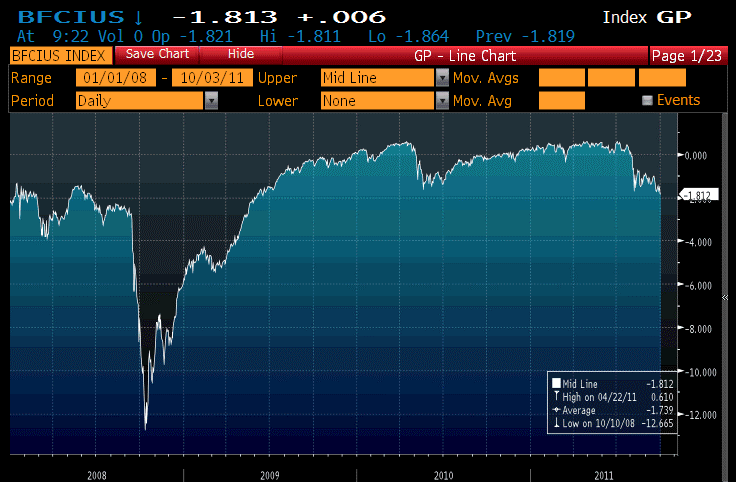Financial Conditions are Driving all the Market Fears
 Positive data and developments on the real economy front are being ignored while increases in financial stress are being focused on. The pervasive gloom in the financial markets is a result of growing fears of another financial crisis. If this were to unfold, the financial crisis would surely cause a global recession but I’m remaining in the camp that a global recession can be averted if financial conditions stabilize. Financial conditions fully reflect the jitters of market participants or investors. Numerous sets of survey data reflect low levels of investor confidence which are being reflected in yield spreads, short-term funding markets, and stock markets around the world. While the stress is nowhere close to the degree it hit during the Lehman event, it is worrisome nonetheless. The source of current financial stress continually revolves back to Europe. The banking system and sovereign debt markets are weakest in Europe and have been supported by ECB intervention. Unfortunately, the ECB and European leaders have been reluctant to come “over the top” at the problem which is not instilling any investor confidence that the fire has been put out. The two items which will improve financial conditions rapidly relate to expanding the size and commitment to the EFSF and recapitalizing the European banking sector.
Positive data and developments on the real economy front are being ignored while increases in financial stress are being focused on. The pervasive gloom in the financial markets is a result of growing fears of another financial crisis. If this were to unfold, the financial crisis would surely cause a global recession but I’m remaining in the camp that a global recession can be averted if financial conditions stabilize. Financial conditions fully reflect the jitters of market participants or investors. Numerous sets of survey data reflect low levels of investor confidence which are being reflected in yield spreads, short-term funding markets, and stock markets around the world. While the stress is nowhere close to the degree it hit during the Lehman event, it is worrisome nonetheless. The source of current financial stress continually revolves back to Europe. The banking system and sovereign debt markets are weakest in Europe and have been supported by ECB intervention. Unfortunately, the ECB and European leaders have been reluctant to come “over the top” at the problem which is not instilling any investor confidence that the fire has been put out. The two items which will improve financial conditions rapidly relate to expanding the size and commitment to the EFSF and recapitalizing the European banking sector.
A larger EFSF with expanded powers (perhaps with the ability to use leverage) effectively takes the sovereign debt issue for Europe off the table for a number of years. Countries don’t give up or default on producing GDP and tax revenues. This issue is very different from the issues related to the mortgage crisis in 2008. Countries will continue to produce and generate tax revenues and they will continue to service debt and attempt to reduce the debt/GDP ratio. While it may be impossible for Greece to ever improve the level of debt burden over time, it is not impossible for Italy, Spain, Belgium, France and others. Whether the ratio starts to decline in 2012, 2013, 2014 or further out is somewhat irrelevant. The commitment to be in the Eurozone and stick with it is all that matters as the ECB can continue to subsidize borrowing costs for years to come through money printing. We do this in many forms here in the US. Inflation is starting to naturally rollover based on financial crisis fears and Europe will need to start shifting gears from fighting inflation battles to fighting confidence battles. The sooner the better for the global financial markets – stay tuned.
The second item related to recapitalizing the banking sector also needs to happen to instill confidence. This is a problem for individual banks and European regulators. The way the system can be stabilized is through capital raises in European financial markets, from Asian or Middle Eastern investors, or if necessary, by European governments directly. Banks will ultimately need to be able to fund themselves in order to instill confidence.
Many equity markets in Europe and Asia are already trading at financial crisis levels of 2 ½ years ago. Given improvements in earnings and cash flows these markets have hit new lows in terms of valuations. An escalation to financial crisis and recession is being partially priced in. There will be tremendous opportunity to profit on the long side, like there was during the depths of the 2008-2009 financial collapse. The key in the short term is timing and risk management. Investors need to monitor financial conditions, sentiment and simply let it unfold. The exact outcomes are unknown to all market participants at this point because this is a crisis of confidence and liquidity more so than a crisis of solvency.


